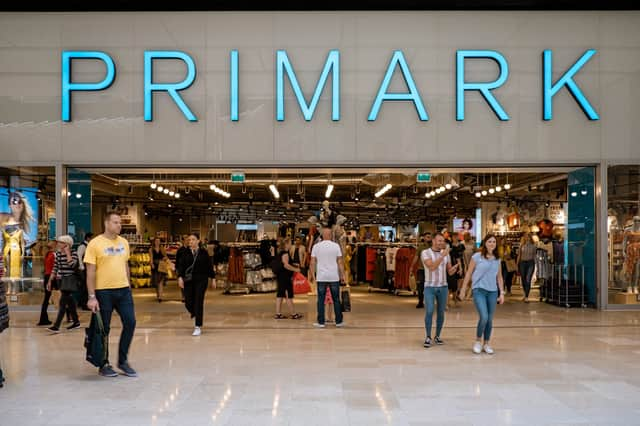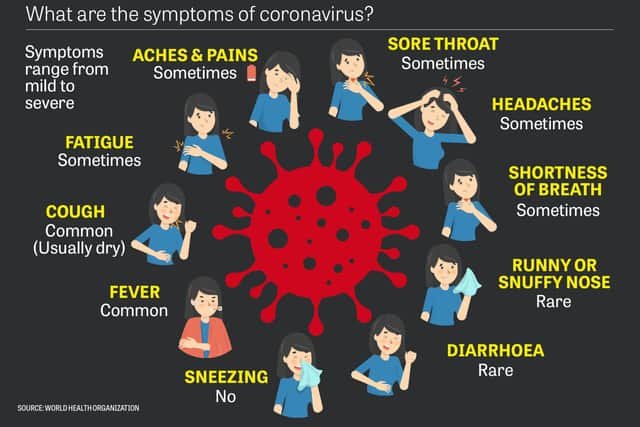These are all of the high street chains temporarily closed due to coronavirus


McDonald's has announced that from Monday (23 March) all of its UK restaurants will be closing amid the coronavirus pandemic, but which other high street chains will also be temporarily shutting their doors?
Shop closures in the UK
In a recent statement, McDonald's said: "This is not a decision we are taking lightly, but one made with the wellbeing and safety of our employees in mind as well as the best interests of our customers.


Advertisement
Hide AdAdvertisement
Hide Ad"We will work with local community groups to responsibly distribute food and drink from our restaurants in the coming days.
"Thank you to our brilliant employees for their hard work during this incredibly challenging time.
"We look forward to seeing you all again as soon as it is safe for us to reopen."
Primark's UK stores have shut until further notice, with the chain wanting to protect the health of both employees and customers.
Advertisement
Hide AdAdvertisement
Hide AdTimpson has already announced UK closures, and Apple has already closed all of its stores worldwide, including the UK.
John Lewis will close all of its 50 shops temporarily from Monday (23 March), which will be for the first time in its 155-year history.
Costa Coffee will also close also UK branches, with hospital branches remaining an exception. Express machines, which can usually be found in garages and supermarket outlets, will remain open where possible.
Nandos are also closing their UK branches until further notice.
Advertisement
Hide AdAdvertisement
Hide AdThe Body Shop, Disney Store, Dorothy Perkins, Gap, H&M, Ikea, Lego Stores, Miss Selfridge, New Look, Oasis, River Island and Topshop have also already temporarily closed.
Urban Outfitters, Nike, and Abercrombie and Fitch are closing their stores across the world to stop the spread of the virus.
Although these closures are temporary, they will undoubtedly have a damaging impact on the economy.
(Photo: WHO)
Closures elsewhere in Europe
From the Eiffel Tower, to the Louvre, major Paris tourist destinations have been closed as a country-wide lock down has been implemented in France.
Advertisement
Hide AdAdvertisement
Hide AdSpain has been suffering the second worst spread of the disease outside of China, with Italy still dealing with high levels of cases and deaths.
Shops, bars, restaurants, theatres, cinemas and sports grounds are all closed in these countries and people are being told to stay at home unless they need essential supplies, medicines, or for work.
Coronavirus: the facts
What is coronavirus?
COVID-19 is a respiratory illness that can affect lungs and airways. It is caused by a virus called coronavirus.
What caused coronavirus?
The outbreak started in Wuhan in China in December 2019 and it is thought that the virus, like others of its kind, has come from animals.
How is it spread?
Advertisement
Hide AdAdvertisement
Hide AdAs this is such a new illness, experts still aren’t sure how it is spread. But.similar viruses are spread in cough droplets. Therefore covering your nose and mouth when sneezing and coughing, and disposing of used tissues straight away is advised. Viruses like coronavirus cannot live outside the body for very long.
What are the symptoms?
The NHS states that the symptoms are: a dry cough, high temperature and shortness of breath - but these symptoms do not necessarily mean you have the illness. Look out for flu-like symptoms, such as aches and pains, nasal congestion, runny nose and a sore throat. It’s important to remember that some people may become infected but won’t develop any symptoms or feel unwell.
What precautions can be taken?
Washing your hands with soap and water thoroughly. The NHS also advises to cover your mouth and nose with a tissue or your sleeve (not your hands) when you cough or sneeze; put used tissues in the bin immediately and try to avoid close contact with people who are unwell. Also avoiding touching eyes, nose and mouth unless your hands are clean.
Government advice
As of the 12 March the Government has moved into the "delay" phase of its plan to tackle coronavirus. Advice is that anyone with a continuous cough or high temperature should self-isolate for seven days. People over 70 have been advised not to go on cruises and schools advised to cancel trips abroad, though schools remain open.
Should I avoid public places?
Advertisement
Hide AdAdvertisement
Hide AdMost people who feel well can continue to go to work, school and public places and should only stay at home and self isolate if advised by a medical professional or the coronavirus service.
What should I do if I feel unwell?
Don’t go to your GP but instead call NHS 111 or look online at the coronavirus service that can tell you if you need medical help and what to do next.
When to call NHS 111
NHS 111 should be used if you feel unwell with coronavirus symptoms, have been in a country with a high risk of coronavirus in the last 14 days or if you have been in close contact with someone with the virus.
Sources: World Health Organisation and NHS